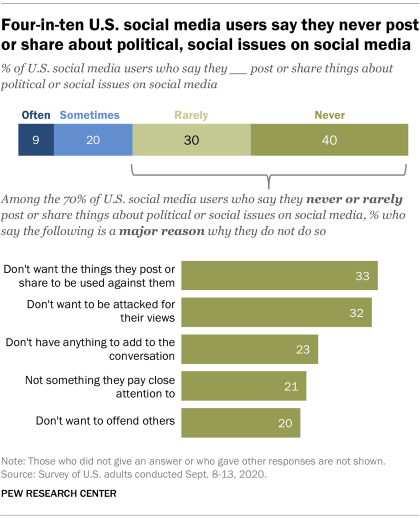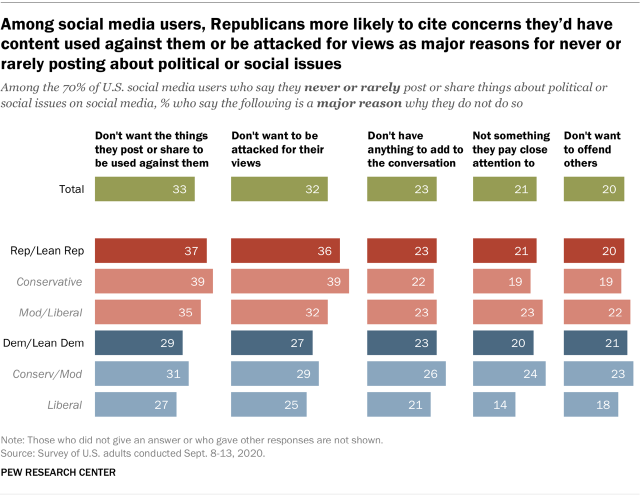According to a Pew Research Center study of US adults conducted Sept. 8-13, 2020, only 9% of adult social media users frequently post or comment on political or social topics. 70% of social media users claim they never (40%) or seldom (30%) do so. 
Four out of 10 Americans claim they never publish or talk on political or social problems online.
The top two reasons people give for not posting about these issues are fear of being attacked for their beliefs. On a third of individuals who never or seldom post or share about these topics cite each statement.
Not having anything to offer to the discourse, not paying close attention to political or social topics, or not wanting to offend others are important reasons for not posting about these subjects.
Their findings are consistent with past Center studies of political posts on social media and other political actions including voting and participation. Those in the ideological middle (conservative or moderate Democrats, liberal or moderate Republicans) are more hesitant to use social media than those on the fringes (liberal Democrats or conservative Republicans).
Moderate or liberal Republicans are 15 percentage points more likely than conservative Republicans to never or seldom post or share about political or social topics on social media (83 percent vs. 68 percent ). Similarly, compared to liberal Democrats, most conservative or moderate Democrats (77%) claim they never or rarely publish this sort of stuff (56 percent ).
In line with other Pew Research Center findings, political posts on social media are relatively rare. For example, from June 2018 to June 2019, just 13% of tweets by US adults with public accounts discussed national politics. Only 6% of these users were “prolific political tweeters” (posting at least 10 tweets during that period, with at least a quarter of those tweets being about national politics). A 2020 investigation indicated that a handful of users create the great bulk of tweets. During the current election season, a separate research found that 55% of Americans were tired of political messages on social media, with Republicans more tired than Democrats.
There are several methods for social media users to be politically or socially engaged, and they change depending on current events. In a 2018 poll, 14% of Americans said they had used a political or social issue hashtag in the last year, and 18% had altered their profile photo to promote a cause. In a June 2020 study, approximately one-in-five social media users (18%) indicated they had used such a hashtag in the last month, while roughly a third (36%) had shared an image to demonstrate their support for a cause.
Similar numbers of Democrats and Republicans in this latest study identify many reasons for not publishing or sharing information regarding political or social concerns. But there are other places where partisanship and ideology shine.

For example, Republicans who use social media but only post occasionally about these issues are more likely than Democrats to state that fear of having their material used against them is a primary factor (37 percent vs. 29 percent ). Conservative Republicans are more likely than moderates or liberals to claim this as a primary reason for rarely or never blogging (36 percent vs. 27 percent).
Also, the Center has looked into political rhetoric and internet harassment: The Center for Public Integrity found that half of Americans who have experienced internet harassment believe it was because of their political beliefs.
Other important reasons for not posting on political or social topics include not wanting to offend people, not paying close attention to these matters, or not having anything to say to the discourse. Among Democratic social media users, occasional posts who identify as conservative or moderate are more likely than liberals to believe the latter two reasons are important.
I think this article was very interesting to read because I identify with those who don't post about my political views on social media. Since I graduate in the fall I am afraid that someone who is looking to hire me will judge me based on my political beliefs. I am already a Black woman so I try not to draw attention to myself so that I am not more likely to be overlooked than I already am. I really appreciated this post!
ReplyDelete